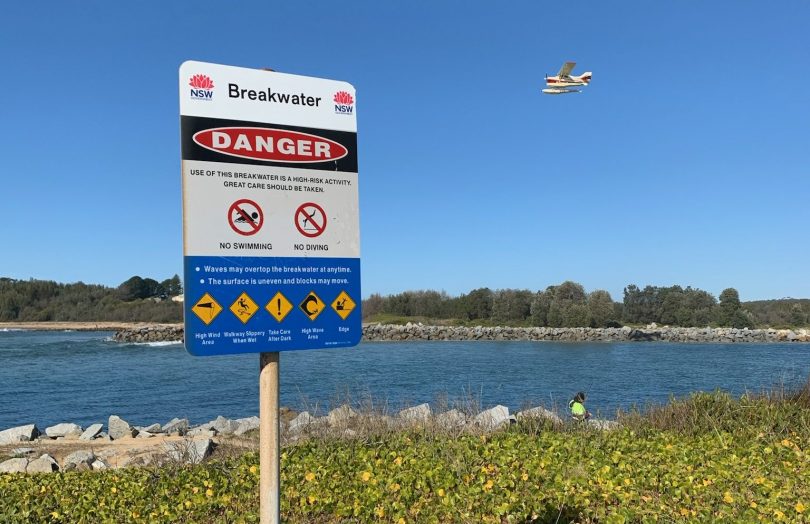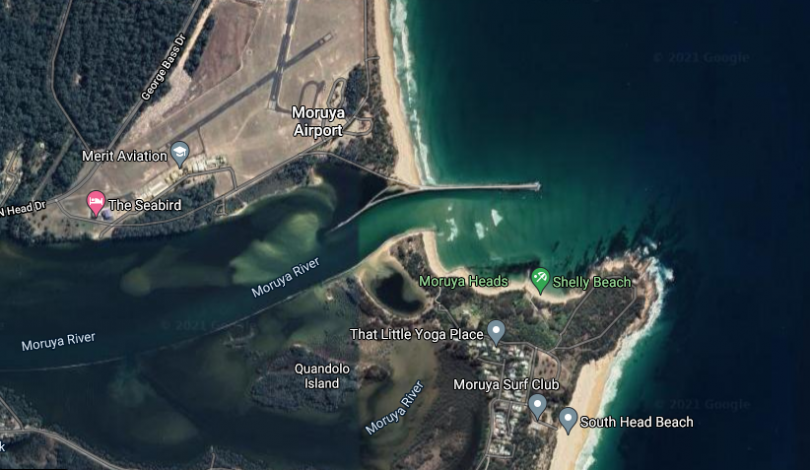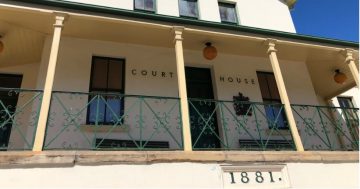
A 13-year-old girl died at the Moruya River bar in 2018. Photo: Kim Treasure.
The father of the 13-year-old Canberra girl who drowned at the Moruya River bar has described the multiple, claustrophobic attempts he made to rescue his daughter from an upside-down boat and came close to dying himself.
The group had travelled from Canberra to go on a fishing trip when, on 23 March 2018, the boat Alan Whittley was skippering capsized at the bar. They were thrown into the water, and no one was wearing lifejackets. The Canberra girl, whose identity has been suppressed, was trapped in the boat’s cabin.
Mr Whittley, a 32-year-old sales manager at Whittley Marine, is currently on trial before Nowra District Court. He is accused of driving the boat in a dangerous way which resulted in her death.
There were six people onboard the 6.2-metre CR2080 Whittley boat Mr Whittley skippered when it left Moruya’s town wharf early in the morning that day: the girl, her father, her brother, a friend, a friend of their family and Mr Whittley.
The girl’s father, who testified to the court on Wednesday and Thursday (12 and 13 May), moved her to the front as she wanted to reproduce a photo taken five years earlier of her appearing to drive a boat.
He said that older picture “is the photo on the back of her tombstone”.
Under questioning from crown prosecutor Michael Fox, the father said he saw another boat ahead of theirs successfully pass the bar, where the Moruya River meets the ocean.
“Follow his wake, keep going, we’re sweet,” he told his skipper.
He said he reached for the lifejackets two times on the trip down the river before pushing them away both times. Mr Fox asked him why he did so.
“I don’t know,” he replied.
The father said they followed the wake of the other boat, but as they passed the end of the rock wall and there was a “rolling wave” heading straight towards them.
He said after they made it over the first wave, a second wave crashed over the roof of their boat and filled it with water, so he told Mr Whittley to “gun it” and get them out of there, but when Mr Whittley accelerated the motor stalled. A third wave struck the boat and flipped it over.

A shot of the Moruya River bar. The line of rocks south of the beach is a break wall that juts into the sea. Photo: Google Maps.
“I’ve never seen anything like it,” he said.
“[They were] freak waves that came out of nowhere.”
He said the boat had clear plastic storm covers around it that prevented rain or spray from getting inside.
When the boat capsized, he said he struggled to get out from underneath.
He got out and saw Mr Whittley, his son and the two other children, but not his daughter, so he stood on the boat and “started screaming for her”.
He said he dove back inside the boat three times to find her and came close to drowning himself, but he became tangled in ropes and fishing line, and when he opened his eyes they were burned by the petrol in the water.
Also, he could not get into the cabin, which is where his daughter was found, because something was blocking the way.
The boat they had been following came to help before emergency services arrived. The father was the last person to be evacuated. He watched scuba divers recover his daughter’s body before they were taken to separate nearby wharves.
“I could see the divers pumping my daughter’s chest the whole way,” he said, his voice breaking at times during his testimony.
The father said he had known Mr Whittley’s family, the Whittley Marine boatbuilders, for as long as he could remember.
Under questioning from defence barrister Arthur Moses SC of New Chambers, he said his long-time friend, Mr Whittley, was a careful skipper who tried to drive the boat safely on that day in March.
“Do you blame Mr Whittley for the death of your daughter?” Mr Moses asked.
“Not at all,” the father replied.
But Mr Fox suggested the father was “biased” towards Mr Whittley because he was a friend.
“No. I’m not biased,” he replied.
He described his daughter as a girl who loved swimming lessons and loved the beach.
“We used to call her a dolphin,” he said.
Mr Whittley has pleaded not guilty to a charge of causing death by culpably navigating in a dangerous manner. The trial continues before Judge Nicole Norman.
Original Article published by Albert McKnight on The RiotACT.








